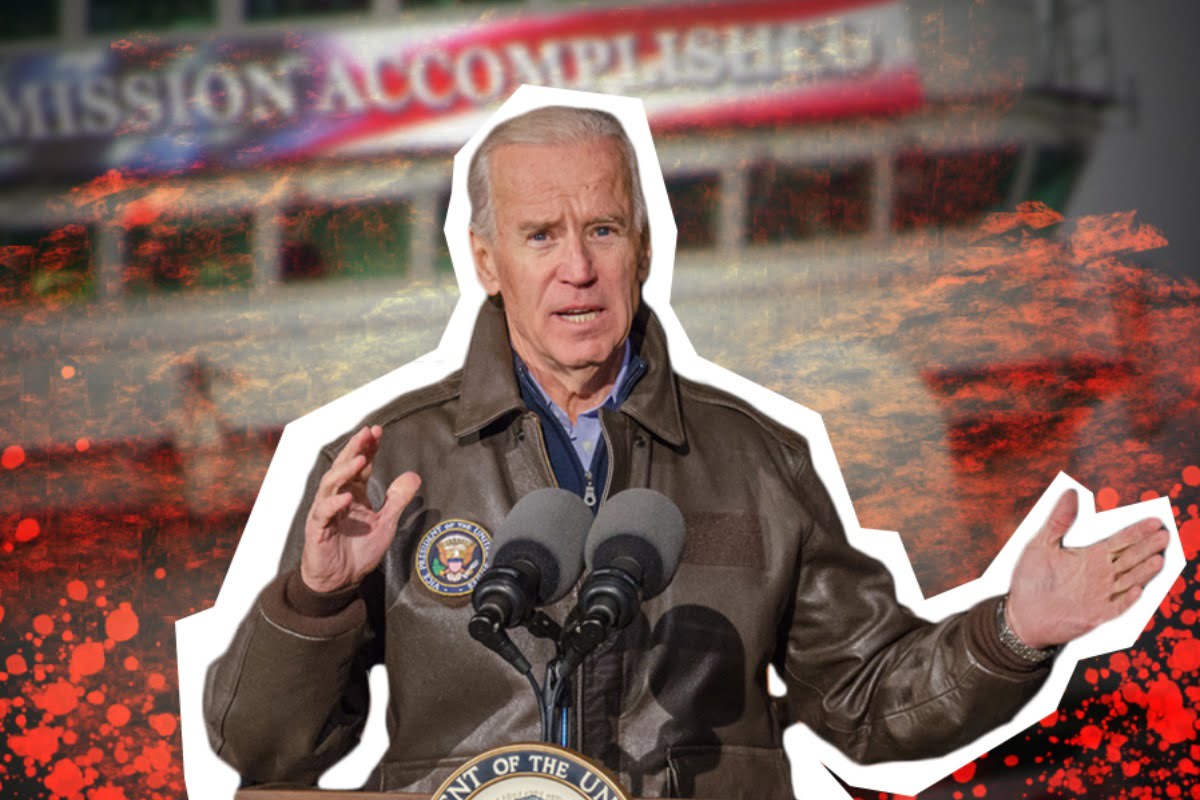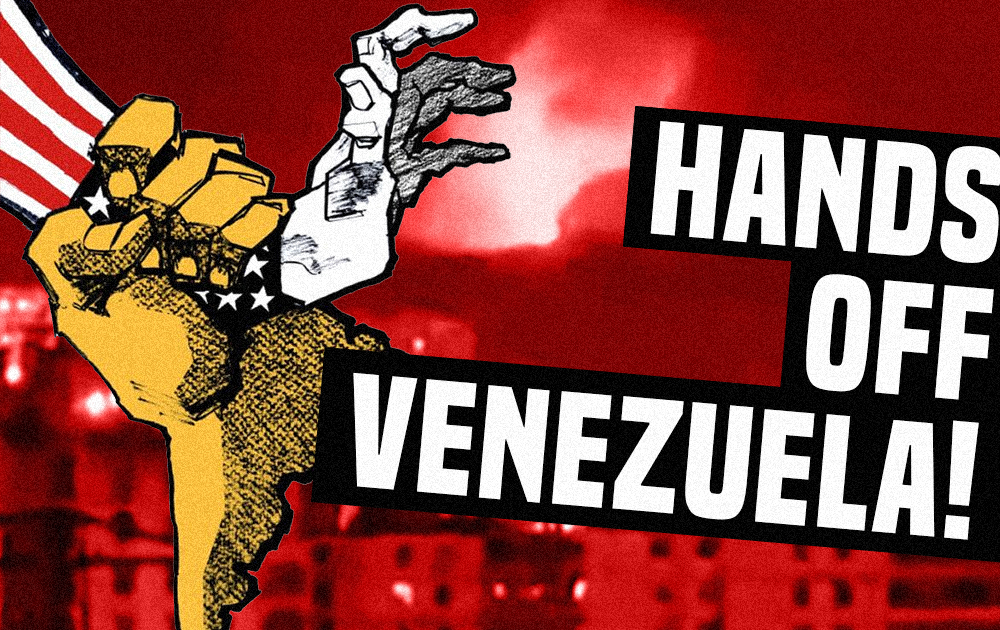The Taliban takeover in Afghanistan marks a humiliating defeat for US imperialism, as the world’s most powerful military force flees after 20 years of waging a fruitless war. The lesson is clear: the Afghan people can trust only in themselves.
America’s longest war has ended in abject shame and humiliation for US imperialism. Twenty years after the invasion of Afghanistan, the most powerful military force the world has ever known has been dealt total defeat at the hands of a band of primitive religious zealots.
The fall of Kabul marked the end of a seven-day blitz in which Taliban forces took over an area comprising more than half of the country, including its most populous cities. They are now in control over every district of the country.
Yet not so long ago, US President Joe Biden assured everybody that the Taliban would not take Kabul; nor would they take control of the whole country. There would be a government of national reconciliation, as agreed with the Taliban. And so on and so forth.
One month ago, Biden confidently pronounced that: “The likelihood there’s going to be the Taliban overrunning everything and owning the whole country is highly unlikely. We provided our Afghan partners with all the tools — let me emphasise all the tools, training and equipment of any modern military.”
Now all these promises have been exposed as so much hot air. The US troops had not even finished their planned withdrawal, when the Taliban pounced like a stalking tiger. The speed of their assault threw the already shambolic government in Kabul into a panic.
Ghani government crumbles
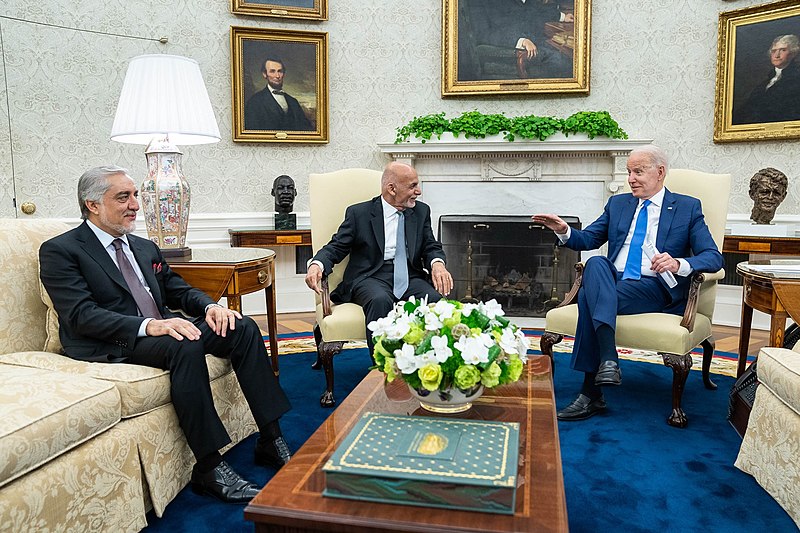 According to US officials, the Afghan regime, its army, and its police, were supposed to take over the running of the country as the US withdrew. But the regime was nowhere to be seen. The Afghan army, trained and armed by the US military and claiming 300,000 troops, melted away in the face of the simply-equipped Islamists, who even by the most generous estimates comprise no more than 75,000 full-time fighters.
According to US officials, the Afghan regime, its army, and its police, were supposed to take over the running of the country as the US withdrew. But the regime was nowhere to be seen. The Afghan army, trained and armed by the US military and claiming 300,000 troops, melted away in the face of the simply-equipped Islamists, who even by the most generous estimates comprise no more than 75,000 full-time fighters.
In the last week, there has been a sharp contrast between the valiant phrase-mongering of the army commanders and politicians – who all vowed to fight to the bitter end – and their complete, treacherous failure to put up any resistance when the time came for it. In one city after another, the same people who had been thumping their chests only days before, handed power to the Taliban and either escaped the country; or in some cases, switched sides and offered their services to the new regime.
The Afghan army swiftly descended into a state of dissolution. City after city fell as government soldiers surrendered in droves, handing their weapons over to the Taliban in exchange for cash.
As the front closed in on Kabul, the government announced that it would negotiate a peaceful transfer of power, which would guarantee the basic rights of Afghans. President Ashraf Ghani even announced that a deal had been struck to form a transitional government composed of representatives of the Taliban and the old regime.
Before any details of such a deal were announced, news arrived that Ghani had fled the country. Ashraf Ghani’s corrupt and reactionary regime collapsed like a house of cards. Ghani made one final TV broadcast to his nation, urging them to fight to the last – then promptly packed his bags and fled in a private plane to Tajikistan, where he can be sure of a comfortable exile, while his people are once more confronted with all the delights of Taliban rule.
The same pattern was seen all over the country. While the masses were being lulled into a false sense of security by official statements, agreements were being struck behind the scenes between officials of the old regime and the Taliban. Some have speculated that the US imperialists also participated in such dealmaking towards the end, in a face-saving exercise to secure a bloodless exit from Kabul and prevent even greater humiliation.
The fall of Kabul
While the likes of Ghani and his cohorts were busy looking after themselves, swarms of Taliban fighters descended on the capital without any resistance. Now the Afghan masses, who have suffered so much at the hand of US imperialism, are bracing themselves for the return of theocratic rule. The return of the Islamic fundamentalists struck terror into the hearts of the Afghan people. As the insurgent forces approached Kabul, panic erupted in the capital.
While the workers, the poor, women, and all others who stand to suffer at the hands of the Taliban were left to their own devices, the rich were busy saving themselves. Scores of members of the elite were seen fleeing the country. Others switched sides and joined the Taliban. Defence Minister Bismillah Mohammadi reportedly fled to the UAE with his sons. Humayoon Humayoon, the former deputy speaker and previously a close ally of Ghani, said that he was appointed as police chief for Kabul by the Taliban.
Guardian front page, Monday 16 August 2021: The fall of Kabul pic.twitter.com/e3Pf6nsSRs
— The Guardian (@guardian) August 15, 2021
In the hours when Kabul was falling, a delegation including warlords and businessmen from the north of the country, which was the strongest base of the old regime, was spotted on a trip to Pakistan – the main financial backer of the Taliban. Presumably, the purpose of their visit was to negotiate their future role within the new order – all while the poor and oppressed were left to fend for themselves.
Despite the official proclamations of the Taliban that it will respect women’s rights and grant amnesty to all those who do not resist it, reports are surfacing of intellectuals and women being killed. In Herat yesterday, female students were turned away from the university and female bank employees were told to go home. In Kandahar, there were reports of door-to-door searches for journalists who have worked with foreign outlets. In the coming days and weeks, this terror will continue as the Taliban attempts to consolidate its rule.
The public spokesmen of the Taliban are putting on a show of sweet reasonableness for the sake of the TV cameras. “We are not the same as before,” they say. “We have learned many lessons.” And so on and so forth. But absolutely no credence can be attached to these statements. Their sole purpose is to soothe the nerves of the ‘international community’, and thereby, they hope, lessen the danger of foreign military intervention.
Evacuation
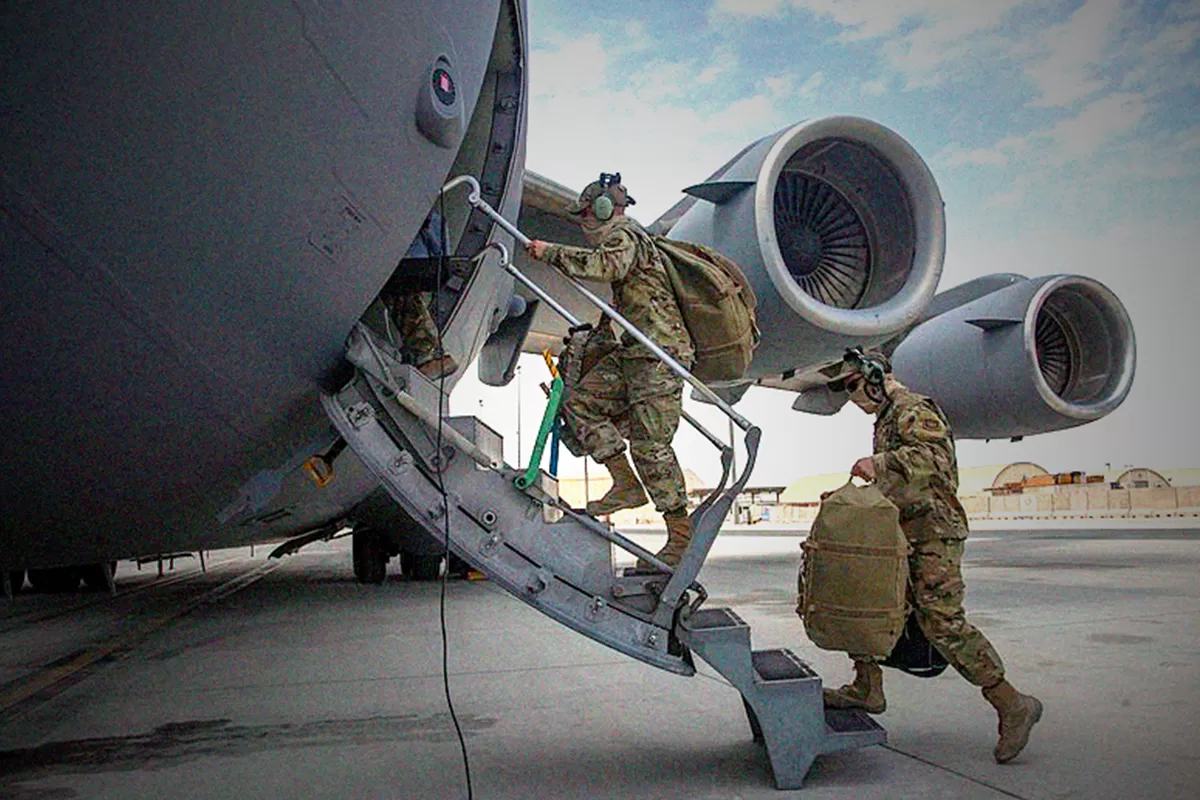 Renewed foreign intervention is a distant prospect, however. Joe Biden has made his choice and there is no going back. His political opponents will seize the opportunity to blacken his name as ‘the man who betrayed the Afghans’. He protested in vain that it was his predecessor, Donald Trump, who took the fateful decision to withdraw US troops from Afghanistan.
Renewed foreign intervention is a distant prospect, however. Joe Biden has made his choice and there is no going back. His political opponents will seize the opportunity to blacken his name as ‘the man who betrayed the Afghans’. He protested in vain that it was his predecessor, Donald Trump, who took the fateful decision to withdraw US troops from Afghanistan.
That will satisfy nobody. In any case, it changes nothing, since neither the Republicans nor anyone else is seriously proposing a new military intervention. True, in the course of one week, the number of US troops deployed in Afghanistan swelled from one thousand to three, then five thousand, and then six thousand.
But the sole intention of sending troops to Kabul is not to fight the Taliban, but to facilitate the evacuation of up to 20,000 US citizens and personnel trapped in Kabul. But even that has proved to be complicated. As the week has progressed, it has become clear that the US isn’t going to do much at all for most of those who stand to be targeted by Taliban repression.
Thousands of Afghans descended on the US consular services to secure a visa and a flight out of the country – no doubt for the vast majority, the effort proved in vain. From Saturday, Kabul’s airport was flooded with desperate people trying to leave the country at the last minute before a Taliban take over.
Others tried to leave by car leading to gridlock and a complete standstill of traffic in the city. The Taliban said that it would allow people to leave Kabul, but where can they go where they will be safe? The idea hinted at by the US administration, that the Taliban can somehow be managed via negotiation, has already proved itself to be a hopelessly naive illusion.
Amidst scenes of chaos and panic at the International Airport, thousands of desperate Afghans attempted to flee before the US finished evacuating all its civilian and military personnel. At that point, their Afghan ‘friends’ and ‘allies’ would be left to their fate in an act of cynical betrayal and cowardice.
This was precisely what was not supposed to happen. The US withdrawal from Afghanistan was supposed to be an orderly affair. According to Biden, there would be no repeat of the US evacuation of Saigon in 1975 – that humiliating debacle that marked the end of the Vietnam War:
“The Taliban is not the south—the North Vietnamese army. They’re not—they’re not remotely comparable in terms of capability. There’s going to be no circumstance where you see people being lifted off the roof of an embassy in the—of the United States from Afghanistan. It is not at all comparable.”
In fact, what we are seeing is precisely an action replay of the Saigon scenario, right down to the scenes of military helicopters airlifting people out of the US embassy. If anything, however, the present scenario is worse. The disarray is such that the Taliban in the majority of cases was marching from district to district virtually unopposed.
Only months ago, when announcing the US withdrawal from Afghanistan, Biden promised that he would guarantee the survival of the Afghan regime; that he would prevent the re-emergence of outright Islamist rule, and that he would protect women’s rights. He would achieve this, somehow, while troops were removed to a safe distance. But it quickly became clear that the US could barely guarantee the safety of its own personnel, let alone the safety of the Afghan people.
Even many of those who had the financial means to secure tickets abroad by air could not board their planes. The US military had shut down Kabul airport to make way for its own flights. Of course, this was the fate of the few well-to-do and middle-class people. Most Afghans cannot even afford a taxi ride to the airport. For them, there is little to do now, but to wait and prepare to endure new, more excruciating levels of hardship.
Eventually, the huge crowds that gathered at the airport since the Taliban took control of the capital, took over the runways in desperate attempts to escape the country. They knew now that their lives were at risk merely for being seen to return home from the airport. But rather than welcoming them, US forces reportedly fired into the air to disperse the crowds of people trying to force their way onto the planes.
On Monday, two men were killed by US soldiers, while three were reported to have died after falling from the underside of a plane that they had attempted to cling to shortly after take-off.
This is a measure of how US imperialism views its ‘allies’ – they are cannon fodder as long as they are useful. Then they are discarded as so much useless trash once they have outlived their usefulness.
How did the Taliban win?
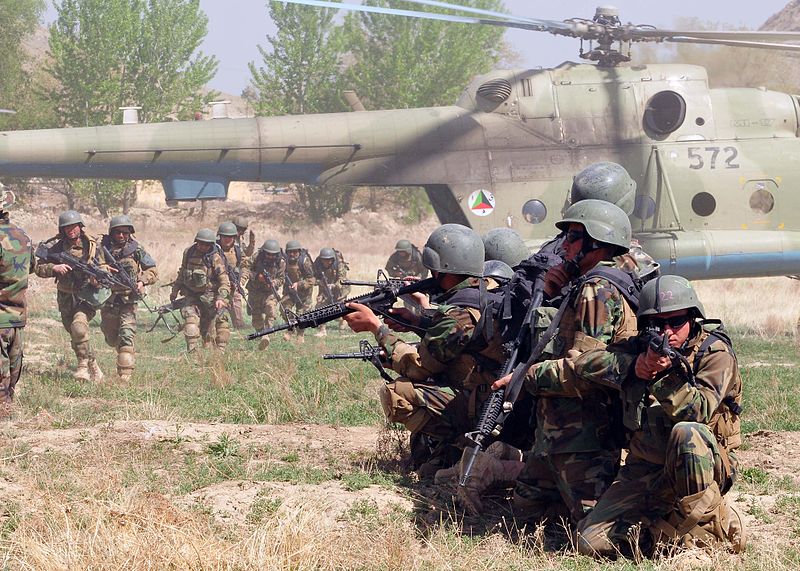 The Biden administration has been quick to point the finger at the Afghan people, calling on them to ‘fight for themselves’. But Biden’s handling of the US withdrawal greatly tilted the balance of forces in the Taliban’s favour. By naming the date for a complete US withdrawal months in advance, he gave the Taliban a green light to attack, as well as all the time they needed to prepare their final offensive.
The Biden administration has been quick to point the finger at the Afghan people, calling on them to ‘fight for themselves’. But Biden’s handling of the US withdrawal greatly tilted the balance of forces in the Taliban’s favour. By naming the date for a complete US withdrawal months in advance, he gave the Taliban a green light to attack, as well as all the time they needed to prepare their final offensive.
But the betrayal went far deeper than this. At the negotiations in February, the US gave in to every single demand that the Taliban presented them with, without getting any concessions in return. In itself, this served to boost the morale of the Islamists, while sending a clear signal to the Afghan army that the US was pulling the carpet from under its feet. A domino effect was set in motion in which Afghan commanders and politicians scrambled to make deals with the Taliban.
Then, despite several warnings from the Pentagon, Biden failed to accelerate US withdrawal plans, imagining that there were months to go before the conflict reached its conclusion. This further magnified the sense of chaos and disarray – to the benefit of the jihadis. At every turn, the incompetence and unpreparedness of the US, and its willingness to cede to any Taliban demand, accelerated the rapid disintegration of the Afghan army and the state apparatus.
The Afghan state was always a mere puppet of US imperialism. It was a tool of the US occupation of Afghanistan, which has cost hundreds of thousands of lives and caused immeasurable misery and suffering for the masses. It was therefore an utterly hated, repressive apparatus. It was composed of the most reactionary opportunists who would willingly sell their country for the right price – a coalition of former expat technocrats, and local warlords and chiefs, for whom the regime and the state was little more than a means of self-enrichment. Under its rule, the people – most of whom live in deep poverty – were unable to access even the most basic public services without a bribe.
The Afghan army, officially composed of 300,000 troops, was full of ‘ghost soldiers’; that is, soldiers who only exist on paper as a means to funnel money into the pockets of commanders and local elites. In the end, its real function was never more than as a cloak for American imperialism. Where it did manage to operate, it was far more often seen as an occupying force than as a national army. It is no wonder that such a rotten edifice, once abandoned by US imperialism, would collapse with a single kick.
The Afghan masses hate the Taliban. But on the other hand, no one believed in the corrupt regime imposed by the US, and certainly no one was willing to risk their lives to save it. By contrast, the Taliban forces are composed of hardened and fanatical Islamic fundamentalists, for whom dying a martyr’s death is the highest prize.
This reactionary movement has been supported and nurtured over decades by the Pakistani ruling class, which has historically wished to dominate Afghanistan. Recently, however, it has also enjoyed increasing support from Iran, China, and Russia, all of whom are wary of the rising instability implicit in the retreat of US power.
This has helped the Taliban gain further momentum. These powers aim to somehow tame the Islamists by offering them economic and political incentives to constrain their activities within Afghanistan’s borders. But this will not necessarily turn out to be a simple feat. The Taliban is not a centralised movement; nor is it driven by rational men who can be easily controlled. US imperialism has had several first-hand experiences to convince them of this fact.
Who can be trusted?
The cynicism of western imperialism stands exposed for the whole world to see. The same people who day-in, day-out talk about so-called ‘western values’ such as ‘democracy’ and ‘human rights’, are now pulling out of Afghanistan and leaving their local helpers at the mercy of a gang of backward barbarians.
The UK defence secretary has expressed sadness that “some people will not get back”, as Britain tries to evacuate its own citizens and some of those Afghans who collaborated with its forces. As long as ‘helping people’ meant bombing and invading a poor nation, no resources were spared. But a line is drawn when ‘helping people’ means securing people’s lives by assisting them to flee a murderous regime.
US imperialism, and the NATO forces supporting them, invaded Afghanistan claiming to want to root out Islamic fundamentalism, and build a modern, democratic nation. Twenty years later, after trillions of dollars have been spent, hundreds of thousands of lives have been lost, and a whole generation has been devastated, Afghanistan stands not one inch closer to these promises.
Having ravaged the country for 20 years, these cowards are now finally fleeing like dogs with their tails between their legs, leaving the Afghan people at the mercy of the Taliban madmen. For this, they deserve to be eternally cursed by the working masses everywhere.
The Afghan masses cannot depend on any of these powers. Neither can they depend on the ruling classes of China, Russia, Iran, or any other power that lurks in the shadows trying to influence the situation in the country today. They can only depend on their own forces, which once mobilised, are far greater than any army. This has been proven throughout their history.
The Afghan people have lived through the hardest times. But time and again they have risen on the back of the most terrible adversity. We have every confidence that they will rise once more and cleanse their country of every shade of obscurantism, reaction, and imperialism.
Defeat, demoralisation and dissent: The crisis of US imperialism
By Andrea Patanè
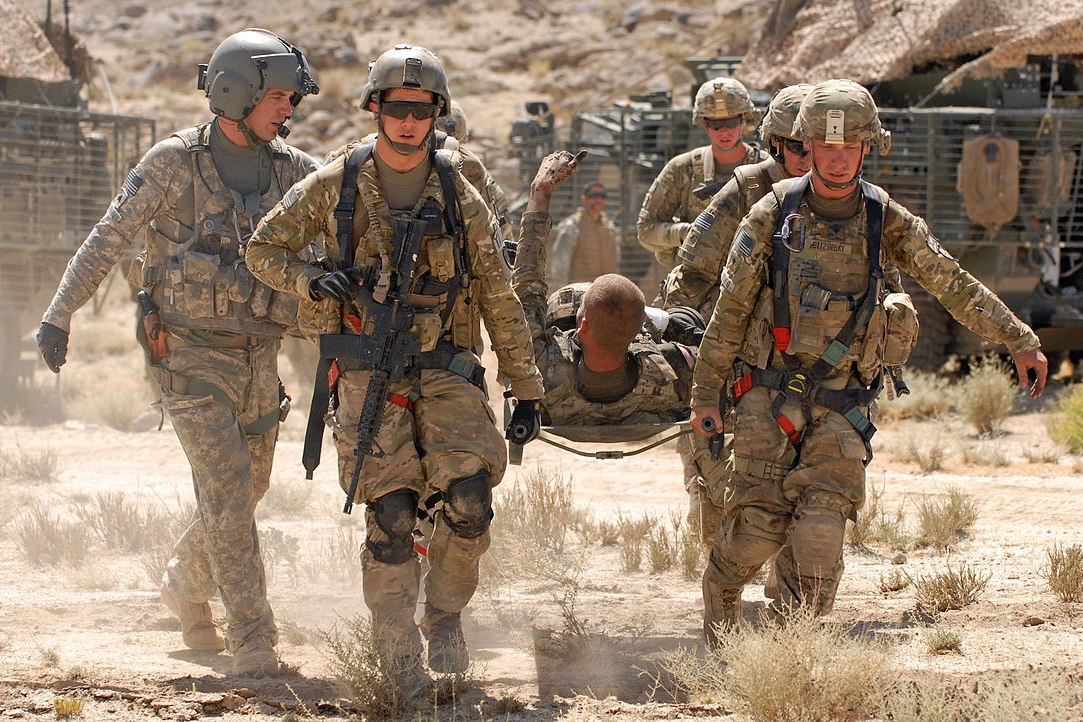 The withdrawal of US troops from Afghanistan has officially brought the two-decades-long deployment in the region to an end. The decision to pull out of this disastrous conflict has widespread support among the US public, with 58 percent in favour, according to a YouGov/Economist poll, demonstrating a deep war-weariness among Americans.
The withdrawal of US troops from Afghanistan has officially brought the two-decades-long deployment in the region to an end. The decision to pull out of this disastrous conflict has widespread support among the US public, with 58 percent in favour, according to a YouGov/Economist poll, demonstrating a deep war-weariness among Americans.
Today, only a minority of Americans (39 percent) think that the ‘War on Terror’ was worth it. These figures are all the more astonishing when compared to the 88 percent support that the invasion enjoyed at its launch in 2001.
This war-weariness is also extending to the rank-and-file of the US Army. An increasing number of US soldiers are questioning the purpose of risking their lives on military adventures that achieve nothing. Returning home, they are left with a legacy of physical and mental trauma. The same governments that could find the material means to send them off to fight in distant lands are apparently unable to find the resources to support veterans struggling with mental health problems, unemployment and homelessness.
An increasing number of ordinary Americans are rejecting US involvement in costly, futile conflicts abroad, particularly when there is rampant poverty and inequality at home. The American ruling class, across partisan lines, is having to swallow the fact that the relative decline of its power coupled with growing discontent at home means that it can no longer play the role that it used to.
The limits of US military might
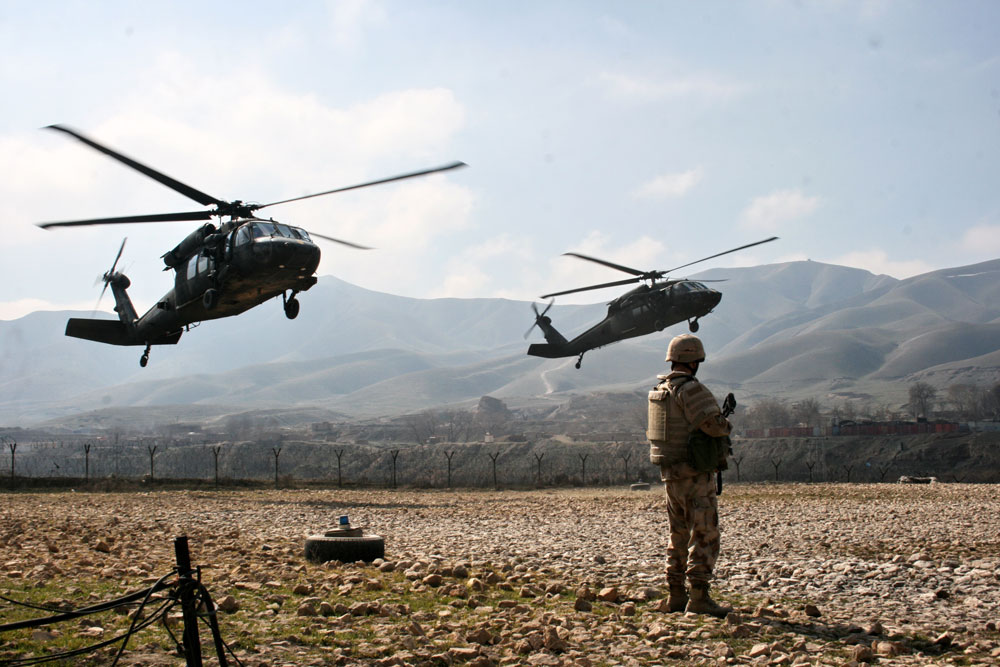 As the predominant imperialist power, in decades past the USA used its military might to defend its markets and protect its spheres of interest all over the world. In the second half of the 20th century, the US engaged in hundreds of armed conflicts internationally.
As the predominant imperialist power, in decades past the USA used its military might to defend its markets and protect its spheres of interest all over the world. In the second half of the 20th century, the US engaged in hundreds of armed conflicts internationally.
But the withdrawal from Afghanistan has become only the latest humiliating debacle to underline that US imperialism has reached reached a limit. Back in 2008, faced with a show of force by a resurgent Russia asserting itself in a conflict with Georgia over South Ossetia, the US could do little other than fulminate on the sidelines. And when in 2014 Crimea was joined with Russia following a referendum, the US ruling class could do little other than stamp up and down and express its anger in words.
In Iraq, despite 4,500 US troops being lost and over 30,000 injured, and a bill running into the trillions, none of the stated aims of US imperialism were achieved. And despite the farcical claim that the Iraq War was part of the ‘War on Terror’, it is only since the US-led invasion that Al-Qaeda has established a foothold in the country, recruiting youth radicalised by US atrocities in Fallujah and elsewhere. Meanwhile, no amount of US troops could prevent Iraq from slipping increasingly under Iranian influence.
In the Obama years, the US struggled even to get domestic backing for limited military airstrikes in Libya and Syria, being forced to rest increasingly on unreliable proxies on the ground. In the end, Obama was forced to effectively hand the reins over to Russia in Syria. The US was reduced to a mere spectator as its ‘moderate’ Islamist proxies were defeated by the Syrian army, allied with Iranian ground forces and Russian air support.
Meanwhile, despite US sabre-rattling about military action in Iran, North Korea and Venezuela, in all cases, these threats have amounted to nothing. Above all, the masses have little enthusiasm for further bloody adventures, and are increasingly unmoved by militaristic jingoism. As such, the US ruling class has been increasingly limited to using its economic might to squeeze its enemies using sanctions.
Donald Trump capitalised on this growing war-weariness in his 2016 presidential campaign as part of his ‘America First’ agenda, which promised to create jobs and prosperity at home, rather than wasting money on “endless wars”.
America’s retreat from Afghanistan, initiated by Trump, is a further demonstration of the inability of the US ruling class to enforce its authority everywhere, in the manner it used to.
Two decades of war have achieved nothing, other than the destruction of hundreds of thousands of lives, the establishment of a crumbling puppet government in Kabul, and the Taliban ending up stronger today than at any time since the war began in 2001. All of America’s military objectives lie in tatters.
A public sick of war
Only 9 percent of the American public supported military intervention in Syria. And Trump’s suggestion that the US would intervene militarily to remove President Maduro from power in Venezuela saw a meagre 20 percent support.
Seeing how little has been gained by endless belligerence, it is little wonder the majority of the US masses want to wash their hands of the catastrophe in Afghanistan and are opposed to their ruling class involving them in further adventures. But the general rejection of conflict is also explained by the economic crisis at home, which has thrown the wasteful expense of America’s ‘forever wars’ into sharp relief. In the final analysis, declining US military power flows from its declining economic power.
A decade of austerity, and an ongoing global pandemic (from which the US has the highest confirmed death toll in the world) have had a devastating effect on people’s lives. This has contributed to a change in consciousness among the masses regarding militarism, and US exceptionalism more generally.
According to a poll by the Ronald Reagan Foundation, only 11 percent of Americans think that military spending should be the highest priority for their government. Healthcare and education programmes are at the top of that list.
The same poll found that, while in 2011 only 8 percent of Americans believed that there were better countries than the US, that figure stands at 21 percent today. It is even higher among the youth, at 36 percent.
President Biden plans to withdraw all US troops from Afghanistan by September 11.
By 44% to 28%, Americans tend to believe the US made a mistake sending troops to fight in Afghanistan, according to YouGov data from March 2020.https://t.co/u5a4wIjCZ9 pic.twitter.com/94sQq4EzNK
— YouGov America (@YouGovAmerica) April 13, 2021
Rejection of the political establishment, evident in movements like the Black Lives Matter protests last year, and even the election of Trump in 2016 (albeit in a distorted way), show the resentment of the masses towards a status quo that offers no future, while politicians waste a fortune on losing wars abroad.
The American Dream has turned into a nightmare. The $2 trillion that was spent on the humiliating disaster in Afghanistan could have solved so many of the urgent needs of US workers and youth. More and more people are drawing the conclusion that the enemy is at home, not abroad.
This is naturally concerning for the ruling class, which understands the risk of provoking further social upheavals by becoming embroiled in endless, costly conflicts while so many ordinary American workers are struggling to keep their heads above water.
The same mood of disaffection that is infecting millions of Americans is also seeping into the ranks of the armed forces. This is hardly surprising. The war in Afghanistan alone cost the lives of 2,448 soldiers, with a further 20,700 wounded, while troops have undergone a spate of pay and benefit cuts in recent years.
155,000 soldiers suffer from chronic depression and PTSD as a result of participating in the ‘War on Terror’, further feeding into a mental health crisis that affects the whole of US society.
A shocking 45,000 members of the US military have taken their lives since 2013. And there are 67,000 homeless war veterans on American streets due to a lack of alternative employment opportunities, and adequate support for the mental and psychological damage that they have suffered.
For all its jingoistic tub-thumping about ‘supporting the troops’, the US ruling class displays utter contempt for its former soldiers, abandoning them to a miserable fate back home.
All these factors, combined with the experience of defeat, and belief that lives are being wasted on pointless conflicts, are severely impacting soldiers’ morale, and their confidence in the top brass. For example, a 2015 poll found that 55 percent of US troops are “pessimistic about their future in the military”, while only 27 percent “thought that [their] leadership had their best interests at heart”.
A recent Financial Times investigation into the Afghanistan withdrawal shed a stark light on this crisis in morale. One veteran confessed: “I was raised with the belief that we’re always the good guys […] I don’t believe the national bedtime story any more.”
Another commented: “The idea that we’ve been walking around with a big stick for 20 years now and breaking shit — really, what has it built, other than a tremendous pile of debt? Death too.”
Across the board, the FT report identifies an increased feeling among the rank-and-file that the “armed forces aren’t being adequately led into the future”.
As an ex-marine explained to the FT journalist:
“If you think the mission your country keeps sending you on is pointless or impossible […] then it’s not the Taliban or al-Qaeda or ISIS that’s trying to kill you, it’s America.”
Diminishing loyalty and confidence in their leadership will undermine the effectiveness of the army and weaken the hand of the ruling class.
Every army necessarily reflects the society out of which it arises. The lack of trust in the military leadership is a reflection of the decline of legitimacy of the establishment and is a product of the crisis of capitalism. Disillusionment in the ranks translates to an increased risk of insubordination, and splits among the troops: a very dangerous scenario for the ruling class.
One recent example of this insubordinate mood coming to the fore occurred last March, when the captain of the US aircraft carrier Theodore Roosevelt decided to evacuate the vessel in order to prevent the spread of COVID-19, in defiance of orders from top brass. The captain’s decision led to him being relieved of duty, but gained sympathy from the crew, whose health was being put at risk by the callous admiralty.
These fissures in the army are potential harbingers of a much more serious crisis of confidence in the ruling class among the working class as a whole, and among capitalism’s armed bodies of men in particular.
US imperialism in decline
In absolute terms, the US is still indisputably the world’s greatest economic and military superpower. Its annual military spending roughly equals that of the other top 10 countries combined.
On a world scale, no power is able to challenge its position. But on a regional level, it can no longer claim to be the strongest power everywhere. In East Asia, China is the strongest military power today. In Syria, Russia and Iran were able to defeat US intervention. And increasingly, we will see that regional powers will become a challenge to US imperialism and further restrict its ability to manoeuvre.
While its relative economic decline has translated into deep disaffection at home, growing protectionist tendencies and national antagonisms are making it increasingly difficult for the US to maintain a united front with its allies – as Biden is finding to his cost.
The relative decline of US imperialism, and the increased war-weariness of the American population, won’t automatically put an end to global conflict. US imperialism still has the power to spread the seeds of barbarism in much of the world. Ultimately, imperialism is a consequence of the capitalist system itself.
As such, even where US power is in a crisis, it will simply create a vacuum that lesser powers will try to fill. This will create the conditions for further proxy wars in Afghanistan, the Middle East, and elsewhere. Only by confining capitalism to the dustbin of history can this nightmare be stopped.
Just as US imperialism is the most reactionary force on earth, so the powerful US working class has immense revolutionary potential, possessing in its hands the power to stop in its tracks the biggest war machine the world has ever known.
The workers and youth of America are increasingly being forced to compare their illusions in a common ‘national interest’ with the reality of the policies of its murderous ruling class. Their eyes are opening up to the fact that they have much more in common with the workers of Karachi or Beijing than they have with the likes of Zuckenberg and Bezos.
They will find common cause with their class brothers and sisters around the world – this is, the cause of the world socialist revolution. And in this struggle, the workers of the US have a key role to play.

